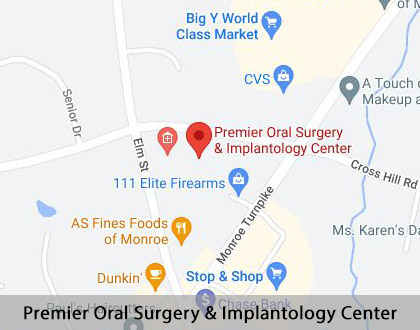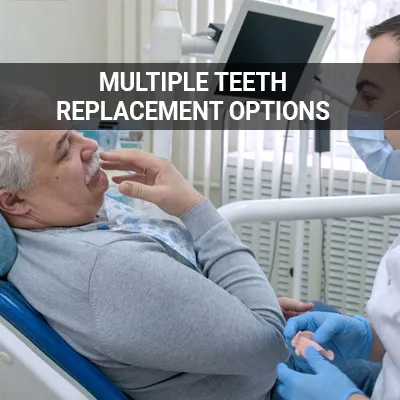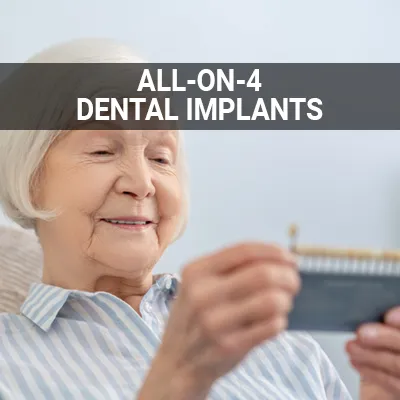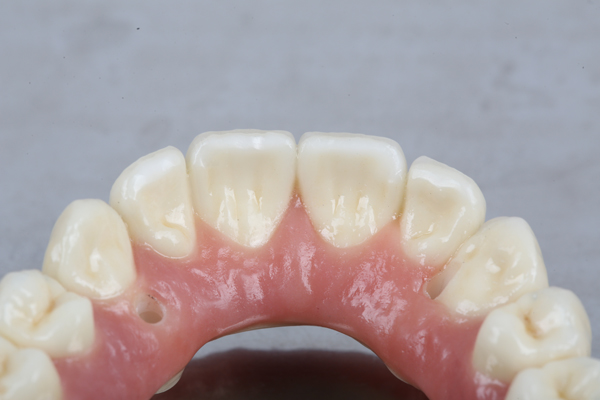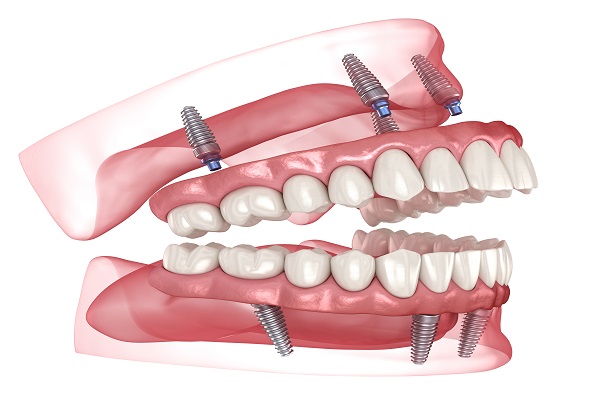Implant Supported Dentures Monroe, CT
Implant-supported dentures are a popular choice for teeth replacements. Dental implants act as artificial tooth roots that connect to custom-made dentures and keep them in place. It is essential for a patient to have sufficient bone mass in their jaw to support implant-supported dentures. In many cases, an oral surgeon may also require the patient to undergo a bone graft procedure before implant surgery.
Implant-supported dentures are available at Premier Oral Surgery & Implantology Center in Monroe and the surrounding area. Our team can help you discover your options and discuss the advantages of this type of procedure. Call us today at (475) 474-6204 to schedule an appointment or learn more about our services.
What are Implant-Supported Dentures?
Implant-supported dentures offer patients an effective, comfortable, and natural-feeling tooth replacement option. They are often a good choice for people who are missing all their teeth but have a strong and substantial jawbone. Implant-supported dentures use dental implants in the jaw to hold dentures in place, so they feel and function more like natural teeth than removable dentures.
For dentures, especially those replacing a full set of teeth, there are two common options: implant-supported (fixed) and removable. As the names imply, the former use implants in the jawbone and are fixed in place, whereas the patient can take out the latter. There are advantages and disadvantages to both types of dentures. Our oral surgeon can help determine if the patient is a candidate for implant-supported dentures or if they will benefit from another treatment option.
“Implant-supported dentures use dental implants in the jaw to hold dentures in place, so they feel and function more like natural teeth than removable dentures.”
Benefits of Implant-Supported Dentures
Experienced oral surgeons are well-educated about the benefits and drawbacks of implant-supported dentures. They can provide knowledgeable guidance to each of their patients. According to the American Academy of Periodontology, implant-supported dentures have many benefits, including:
- Comfort: This type of denture is more comfortable than removable dentures. They stay in place more firmly. This means they will not rub against the inside of the mouth or cause sores in the same way that loose, removable dentures can.
- Natural-Looking: Implant-supported dentures look like natural teeth. So, a beautiful smile is achievable without looking like a set of dentures. This can be a significant confidence boost for many patients.
- Effective Tooth Replacements: While people use their teeth for chewing, they also affect speech. Fixed dentures are more similar to natural teeth in terms of function. So, patients who have them typically enjoy a greater quality of life.
- Support Bone Health: Removable dentures can constantly harm the jawbone by pressing and rubbing against it constantly. In contrast, implant-supported dentures are more firmly fixed. They interact with the jawbone much like natural teeth.
Many patients who choose implant-supported or fixed dentures report that they feel like natural teeth since they can eat and brush without issue. Fixed appliances usually only require the same level of oral care as natural teeth do with regular brushing.
“Many patients who choose implant-supported or fixed dentures report that they feel like natural teeth as they can eat and brush normally.”
Signs You Need Implant-Supported Dentures
There are many reasons a patient may seek implant-supported dentures instead of other tooth replacement options. Implant-supported dentures are an effective choice for patients in good oral health with enough bone density to support implants.
Common signs an individual may need or seek implant-supported dentures include:
- Difficulty eating, chewing, or speaking
- Removable dentures are difficult to keep in place
- Mouth sores
- Receding gums or bone
- Some or all missing teeth
Implant-supported dentures require a more extensive procedure for their placement. However, they can be a permanent solution to missing teeth with proper care once they are in place. Additionally, they look, feel, and function like natural teeth.
“According to the American Dental Association, implant-supported dentures are for patients in good oral health with enough bone density to support implants.”
Check out what others are saying about our dental services on Yelp: Implant Supported Dentures in Monroe, CT
The Treatment Process
There are several steps in receiving implant-supported dentures, including the initial consultation, two surgeries, denture placement, and recovery. Steps may differ depending on the patient’s case and any other required treatments in their treatment plan.
Consultation
In order to begin the process, the oral surgeon will perform an examination and consultation to determine if dental implants are right for the patient. Dental implants require adequate bone density in the jaw to support the implants. Patients with deteriorated jaws may not be able to receive implants. However, as technology advances, oral surgeons can increasingly strengthen and augment the jaw to allow implantation.
Implantation
A small incision is made during the first surgery to expose the bone underneath the gums. The oral surgeon will drill holes deep into the bone to make space for the implants. A temporary artificial tooth may be placed for aesthetic purposes until the second surgery.
Osseointegration
Osseointegration is the process in which the jawbone naturally forms with the dental implant. The implant then acts as a natural tooth root, and an abutment can be placed to secure the dentures. Osseointegration is a natural process that should occur on its own if the patient is in good oral health and follows the oral surgeon’s post-surgical care instructions.
Second surgery
During the second operation, the oral surgeon will make another small cut in order to expose the implant. The abutment is placed, and the gum tissue is secured around the implant, leaving only the abutment exposed. The patient must wait two weeks for the gums to heal once again. During the final visit, our team will place the dentures over the abutment before we ensure they fit properly, are comfortable, and need any adjustments.
Recovery
There are various waiting periods in which the bone, gums, and surrounding tissues heal naturally. During these periods, patients will be given specific instructions on keeping the area clean for a healthy and uncomplicated recovery. Following each procedure, patients are prescribed antibiotics and pain-relief medication to reduce or eliminate discomfort, risk of infection, and other symptoms or complications. Those who experience swelling, bruising, pain, or bleeding should contact us immediately.
“There are several steps in receiving implant-supported dentures, including the initial consultation, two surgeries, denture placement, and recovery.”
Questions Answered on This Page
Q. What are implant-supported dentures?
Q. What are the benefits of implant-supported dentures?
Q. What are the signs you need implant-supported dentures?
Q. What are the steps of an implant-supported dentures procedure?
Q. How do I care for my implant-supported dentures at home?
People Also Ask
Q. How do dentists determine whether a patient qualifies for dental implants?
Q. What are a patient’s options for replacing multiple teeth?
Q. Who is a good candidate for All-on-4?
Q. When is bone grafting necessary?
Q. How should I prepare for sedation dentistry?
Q. What are the steps to the dental implant procedure?
Q. How can patients get information about a standard dental implant procedure?
At Home Care
As previously noted, we will provide patients with after-care instructions following each procedure. Once the patient has completed the entire process, they will be given specific instructions to properly care for and maintain their dentures at home. This includes oral hygiene care, diet, and dental and prosthodontic appointments.
Although dentures are artificial teeth, they should be treated and cleaned like natural teeth to maintain proper functioning. We recommend patients brush twice a day, floss, and use an antiseptic mouthwash. It is important to maintain regular dental appointments to ensure the dentures are functioning properly and determine whether they require any adjustments. In most cases, patients do not need to adjust their diet long-term. However, they may need to make a few changes in the beginning stages of treatment as they become accustomed to their new teeth.
“It is important to maintain regular dental appointments to ensure the dentures are functioning properly and determine whether they require any adjustments.”
Frequently Asked Questions
Q. Why can I not have an implant for each tooth?
A. Although single-tooth implants are a good treatment, it is not necessary when replacing a row of teeth. It is more cost-effective and requires a less invasive procedure for implant-supported dentures. It is an equally effective but simpler treatment.
Q. How many implants will I need?
A. Typically, implant-supported dentures are connected to the mouth with between two and five implants. It is common for an entire row to attach to four implants. However, the number needed varies on a case-by-case basis.
Q. How long do implant-supported dentures last?
A. Implant-supported dentures are a type of permanent appliance. With proper care and regular check-ups, they can last a lifetime. Your oral surgeon will let you know about the required maintenance and care.
Q. What is the success rate of implants?
A. With an experienced oral surgeon, implants have a success rate of over 95%. Placement is a relatively simple procedure. However, it sometimes requires sedation, and there are occasionally minor complications.
Q. Which type of dentures do I need?
A. It will depend on your needs, as no smile is the same. Our oral surgeon will provide a consultation and exam when you visit our office. This initial evaluation will help inform the treatment plan.
Start Feeling Better – Visit Us Today
By visiting us as soon as possible, our team can help get you the professional treatment you need. Instead of waiting around and allowing the symptoms to get worse, we can provide you with treatment options.
Call Us Today
Implant-supported dentures can give you a brand-new smile you can be proud to show off. Our oral surgeon can recommend these dentures to boost the appearance of a smile along with enhancing your oral health. Call us today at 475-474-6204 to schedule an appointment or learn more about implant-supported dentures.
Helpful Related Links
- American Dental Association (ADA). Glossary of Dental Clinical Terms. 2023
- American Academy of Cosmetic Dentistry® (AACD). Home Page. 2023
- American Academy of Maxillofacial Prosthetics. American Academy of Maxillofacial Prosthetics. 2023
- American Association of Oral and Maxillofacial Surgeons. American Association of Oral and Maxillofacial Surgeons. 2023
- American College of Oral and Maxillofacial Surgery. American College of Oral and Maxillofacial Surgery. 2023
- National Cancer Institute (NCI). National Cancer Institute (NCI). 2023
- WebMD. WebMD’s Oral Care Guide. 2023
About our business and website security
- Premier Oral Surgery & Implantology Center was established in 2019.
- We accept the following payment methods: American Express, Cash, Discover, MasterCard, and Visa
- We serve patients from the following counties: Fairfield County
- We serve patients from the following cities: Monroe, Botsford, Stepney, Shelton, Trumbull, Ansonia, Derby, Oxford, Woodbridge, Newtown, and Redding
- Norton Safe Web. View Details
- Trend Micro Site Safety Center. View Details
Back to top of Implant Supported Dentures

